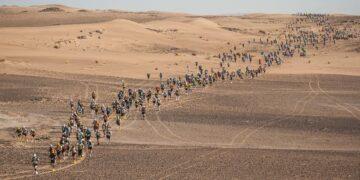Contents
Questo articolo è disponibile anche in:
What was life like in the 20th century Morocco? An interesting way to find out is reading “Le pain nu”: a sincere and ruthless work by Muhammad Shukri (1935-2003) which depicts a scandalous image of the Moroccan Rif from the last century. It is an autobiographical story without filters and with a strong spirit of social protest, in which the Moroccan author has “bared” his own experiences. For years, this work was censored and banned in Morocco. What are the reasons for this condemnation?
Poverty and violence in “Le pain nu”
“Le pain nu”, completed in 1973, is the first work of an autobiographical trilogy in which Muhammad Shukri has narrated the dramas of his life. From poverty to violence, from abuse to sex and drug addiction: the Moroccan author’s story appears merciless and forthright.
Shukri, who was born in the degraded Rif of the mid-1900s, offers the reader an extremely bitter picture of his childhood and youth. The historical context is precise. It is that of the Spanish and French protectorates.
The author deals with many themes in the book. He talks about “a hunger that hurts”, which forces children like him to rummage in the rubbish in search for food. He describes the repeated domestic violence at the hands of his father, the “monster”. Likewise, he briefly mentions numerous, sadly too many, episodes of abuse, degradation, and violence that a child should never know: theft, prostitution, gambling, abuse of power.
Among the latter, significant are the pages on the tragic events of March 30 of 1952, the so-called “black day”. Shukri witnessed the brutal acts of the police against the crowds who took to the streets to demonstrate against the French protectorate in force since 1912.
A censorship that lasted 27 years
The extreme frankness and brutality of Muhammad Shukri’s themes and style constitute the main features of “Le pain nu”. The denunciation and criticism of the degradation which characterized Morocco contributed to the flourishing of his success at an international level. The book was, in fact, translated into several languages, but as mentioned above, the work was also subject to heavy censorship in Morocco, which lasted for a long time.
In fact, the work was banned until 2000, for 27 years, due to the “uncomfortable” contents and the crude and vulgar language used. Furthermore, the coverage of numerous taboo subjects, such as overly explicit sexual descriptions, caused Shukri’s text to be censored in other Muslim countries as well. In the conservative Muslim society of the last century, many of the episodes recounted by the Moroccan author were unacceptable, scandalous, and offensive.
Nonetheless, the censorship of “Naked bread” probably increased its popularity, and the social value of the work was subsequently re-evaluated. The merit of the author lies in having fearlessly told shocking truths of the 1900s Rif society, challenging its hypocrisy, and exposing all its critical issues. Works like this are more than just narratives: they are immersive journeys of real lives in not-too-distant times.
Stay up to date by following us on Telegram!
.














